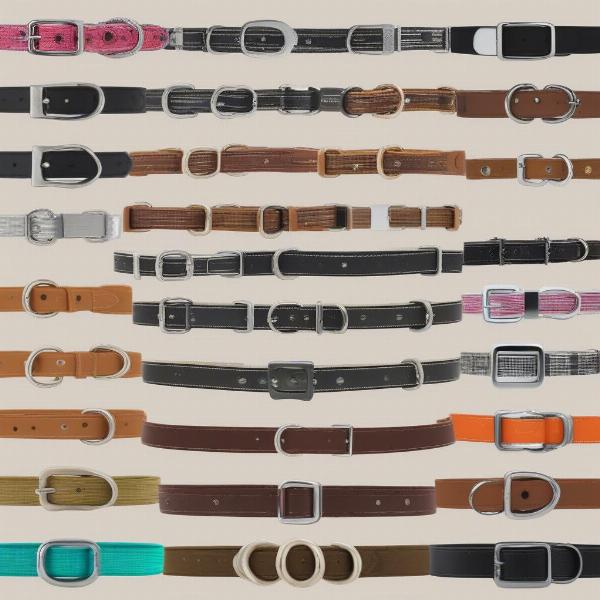Finding the perfect large dog collar can be a challenge. With so many options available, considering factors like size, material, and purpose is crucial. This guide provides everything you need to know to choose the right large dog collar for your furry friend, ensuring both comfort and safety.
Understanding Your Large Dog’s Needs
Before diving into the specifics of large dog collars, consider your dog’s individual needs. A young, energetic Great Dane will require a different collar than a senior Mastiff. Think about their activity level, training requirements, and any specific health concerns. This will guide you towards the most suitable collar type.  Choosing a large dog collar
Choosing a large dog collar
Types of Large Dog Collars
Several types of large dog collars cater to different needs and preferences. Flat collars are a standard choice, ideal for everyday use and attaching ID tags. Martingale collars are designed for dogs who tend to slip out of their collars, gently tightening when they pull. Head halters offer more control, particularly for strong pullers, while harnesses distribute pressure across the chest and back, minimizing strain on the neck. Finally, specialized collars exist for training, tracking, or even aesthetic purposes.
Choosing the Right Material
Large dog collars come in various materials, each with its pros and cons. Durable nylon collars are popular for their affordability and weather resistance. Leather collars offer a classic, stylish look and soften over time, conforming to your dog’s neck. Metal chain collars can be strong but require careful consideration for comfort and potential damage to the dog’s coat. Biothane collars, made from coated webbing, offer exceptional durability and are easy to clean. Choosing the right material depends on your dog’s lifestyle and your personal preference.
Sizing Your Large Dog’s Collar
Proper fit is crucial for both comfort and safety. To measure your dog’s neck, use a flexible measuring tape and wrap it snugly around the widest part of their neck, allowing for two fingers to fit comfortably between the collar and their skin. Refer to the manufacturer’s sizing chart for the specific collar you’re considering, as sizes can vary between brands. A properly fitted collar should be snug but not restrictive, allowing your dog to breathe and move freely.
Training and Behavioral Considerations
For training purposes, consider a slip lead or a martingale collar, which provide gentle corrections without choking. Avoid using choke chains or prong collars, as these can cause pain and injury. Positive reinforcement methods, combined with the right collar, are the most effective way to train your large dog.
Maintaining Your Large Dog’s Collar
Regular cleaning and inspection are essential for maintaining the collar’s integrity. Leather collars require occasional conditioning to prevent cracking, while nylon collars can be washed with mild soap and water. Check for signs of wear and tear, such as fraying or broken buckles, and replace the collar as needed.
Conclusion
Choosing the right large dog collar involves careful consideration of your dog’s individual needs, the collar’s type and material, and proper sizing. By following these guidelines and prioritizing your dog’s comfort and safety, you can find the perfect collar to accompany your furry friend on all their adventures.
FAQs
- What type of collar is best for a large dog that pulls? A harness or head halter can be helpful for large dogs who pull, distributing pressure more evenly and providing better control.
- How often should I clean my dog’s collar? Cleaning frequency depends on the material and how dirty it gets. Generally, cleaning every few weeks is a good practice.
- Can I use a chain collar on my large dog? Chain collars can be risky and may cause damage to your dog’s fur or skin. Consult a professional trainer before using one.
- What’s the difference between a martingale collar and a flat collar? Martingale collars provide more control for dogs who tend to slip out of their collars, while flat collars are standard for everyday use.
- How do I know if my dog’s collar fits correctly? You should be able to fit two fingers comfortably between the collar and your dog’s neck.
- What material is best for a large dog collar? Nylon and leather are popular choices, offering durability and comfort respectively. Biothane is another excellent option for its strength and easy maintenance.
- Where can I find large dog collars? You can find a wide selection of large dog collars at pet stores, online retailers, and specialized dog boutiques.
ILM Dog is your trusted source for expert advice on all aspects of dog care and well-being. We offer comprehensive information on dog breeds, health, training, nutrition, grooming, and much more. Whether you’re a new dog owner or a seasoned expert, ILM Dog has the resources you need to provide the best possible care for your canine companion. Contact us today at [email protected] or +44 20-3965-8624 for personalized guidance. ILM Dog is dedicated to helping you build a stronger bond with your furry friend.